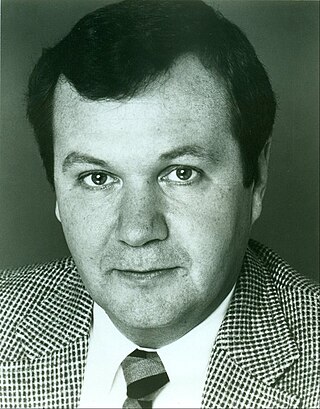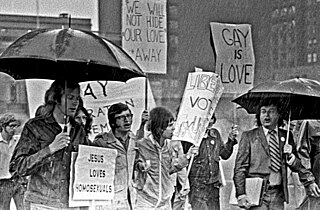
Lesbian, gay, bisexual, transgender and queer (LGBTQ) movements are social movements that advocate for LGBTQ people in society. Although there is not a primary or an overarching central organization that represents all LGBTQ people and their interests, numerous LGBT rights organizations are active worldwide. The first organization to promote LGBT rights was the Scientific-Humanitarian Committee, founded in 1897 in Berlin.
This is a list of notable events in the history of LGBT rights that took place in the year 1973.
This is a list of notable events in the history of LGBTQ rights that took place in the year 1971.
This is a list of notable events in the history of LGBT rights that took place in the year 1972.
The origin of the LGBT student movement can be linked to other activist movements from the mid-20th century in the United States. The Civil Rights Movement and Second-wave feminist movement were working towards equal rights for other minority groups in the United States. Though the student movement began a few years before the Stonewall riots, the riots helped to spur the student movement to take more action in the US. Despite this, the overall view of these gay liberation student organizations received minimal attention from contemporary LGBT historians. This oversight stems from the idea that the organizations were founded with haste as a result of the riots. Others historians argue that this group gives too much credit to groups that disagree with some of the basic principles of activist LGBT organizations.
Libertarian perspectives on LGBT rights illustrate how libertarian individuals and political parties have applied the libertarian philosophy to the subject of lesbian, gay, bisexual and transgender (LGBTQ) rights. In general, libertarians oppose laws which limit the sexual freedom of adults. However, they may also oppose hate crime legislation, viewing it as antithetical to freedom of speech, and oppose discrimination laws on the grounds that it would constitute government overreach into private enterprise.

Canadian lesbian, gay, bisexual, and transgender (LGBTQ) rights are some of the most extensive in the world. Same-sex sexual activity, in private between consenting adults, was decriminalized in Canada on June 27, 1969, when the Criminal Law Amendment Act, 1968–69 was brought into force upon royal assent. In a landmark decision in 1995, Egan v Canada, the Supreme Court of Canada held that sexual orientation is constitutionally protected under the equality clause of the Canadian Charter of Rights and Freedoms. In 2005, Canada became the fourth country in the world, and the first in the Americas to legalize same-sex marriage. In 2022, Canada was the third country in the world, and the first in North America, to fully ban conversion therapy nationwide for both minors and adults.
This is a timeline of notable events in the history of the lesbian, gay, bisexual and transgender (LGBT) community in Canada. For a broad overview of LGBT history in Canada see LGBT history in Canada.
Although same-sex sexual activity was illegal in Canada up to 1969, gay and lesbian themes appear in Canadian literature throughout the 20th century. Canada is now regarded as one of the most advanced countries in legal recognition of lesbian, gay, bisexual, transgender and queer (LGBTQ) rights.
This article gives a broad overview of lesbian, gay, bisexual and transgender (LGBT) history in Canada. LGBT activity was considered a crime from the colonial period in Canada until 1969, when Bill C-150 was passed into law. However, there is still discrimination despite anti-discrimination law. For a more detailed listing of individual incidents in Canadian LGBT history, see also Timeline of LGBT history in Canada.
The Civil Rights Agenda (TCRA) is a civil rights advocacy organization founded in June 2010 by Jacob Meister, with a stated mission "to maintain and increase individual rights for Lesbian, Gay, Bisexual, Transgender, and Queer (LGBTQ) citizens in Illinois through inter-generational volunteerism and community-driven project-based education, statewide coalition and network building, and leadership in supporting underserved communities with the necessary tools that will equip members of those communities with the resources and confidence to establish equality for all persons, regardless of sexual orientation or gender identity."
The Canadian Centre for Gender and Sexual Diversity (CCGSD) is a charitable organization which works towards stopping bullying, discrimination, and homophobia in schools and communities in Canada, and abroad. Through workshops, presentations, training conferences, and by supporting youth initiatives, they engage youth in celebrating diversity of gender identity, gender expression, and romantic orientation and/or sexual orientation.
The state of North Dakota has improved in its treatment of lesbian, gay, bisexual and transgender residents in the late 1990s and into the 21st Century, when the LGBT community began to openly establish events, organizations and outlets for fellow LGBT residents and allies, and increase in political and community awareness.

Peter Maloney is a Canadian lawyer, businessman, activist and former politician, most noted as one of the first Canadian political figures ever to come out as gay and as a prominent builder of Toronto's LGBT community in the 1970s and 1980s.
Barbara Thornborrow is a former private who was involuntarily discharged from the Canadian Armed Forces for being a lesbian in 1977. She later challenged the decision, becoming the first person who was discharged based on their sexual orientation to do so publicly.

The following is a timeline of lesbian, gay, bisexual, and transgender (LGBT) history in the 20th century.
This overview shows the regulations regarding military service of non-heterosexuals around the world.

The We Demand Rally was the first large scale gay rights demonstration in Canada. The rally occurred on August 28, 1971 in Ottawa, and was organized by the gay rights activist groups Toronto Gay Action (TGA) and Community Homophile Association of Toronto (CHAT). There was a parallel rally in Vancouver that was organized in solidarity with the rally by the Vancouver group Gay Alliance Toward Equality (GATE). The rally plays an important part in the history of queer equity-seeking and gay rights in Canada, as well as the history of feminism in Canada, and has had a lasting legacy in Canadian gay rights activism.




